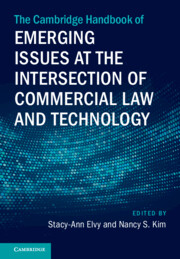Book contents
- The Cambridge Handbook of Emerging Issues at the Intersection of Commercial Law and Technology
- The Cambridge Handbook of Emerging Issues at the Intersection of Commercial Law and Technology
- Copyright page
- Epigraph
- Contents
- Figures
- Tables
- Contributors
- Preface
- Acknowledgments
- Part I Contemporary Technological Developments
- 1 Non-fungible Tokens in Commercial Transactions
- 2 The Challenges of Technological Property
- 3 Regulation under the EU Artificial Intelligence Act
- 4 Blockchain and the Uniform Commercial Code
- 5 Can Technology Foster Price Transparency in Credit Card Processing Markets?
- 6 Quantum Privacy
- 7 Give It Back
- Part II The Implications of Emerging Product Design and Business Models
- Part III Contracting and Dispute Resolution
- Index
2 - The Challenges of Technological Property
from Part I - Contemporary Technological Developments
Published online by Cambridge University Press: 08 February 2025
- The Cambridge Handbook of Emerging Issues at the Intersection of Commercial Law and Technology
- The Cambridge Handbook of Emerging Issues at the Intersection of Commercial Law and Technology
- Copyright page
- Epigraph
- Contents
- Figures
- Tables
- Contributors
- Preface
- Acknowledgments
- Part I Contemporary Technological Developments
- 1 Non-fungible Tokens in Commercial Transactions
- 2 The Challenges of Technological Property
- 3 Regulation under the EU Artificial Intelligence Act
- 4 Blockchain and the Uniform Commercial Code
- 5 Can Technology Foster Price Transparency in Credit Card Processing Markets?
- 6 Quantum Privacy
- 7 Give It Back
- Part II The Implications of Emerging Product Design and Business Models
- Part III Contracting and Dispute Resolution
- Index
Summary
This chapter explores the intersection of property law and consumer protection in the digital age, particularly in the context of purchasing technological or digital goods. The unique nature of transactions involving autonomous vehicles, drones, robot-chefs, smart appliances, and eBooks raises questions about the traditional understanding of property rights. While existing critiques often rely on contract law and consumer protection regulations, this chapter argues for the affirmative use of property law in addressing the challenges posed by the restricted usability and alienability of digital products. The prevailing assumption that property law is unsuitable for such issues is challenged, and the chapter advocates for a theoretical and normative shift. By analyzing the regulation and management of technological property through a property law lens, the chapter proposes a new perspective and outlines a roadmap for understanding and addressing the property challenges inherent in the digital consumer landscape.
- Type
- Chapter
- Information
- The Cambridge Handbook of Emerging Issues at the Intersection of Commercial Law and Technology , pp. 34 - 50Publisher: Cambridge University PressPrint publication year: 2025

